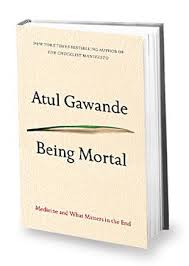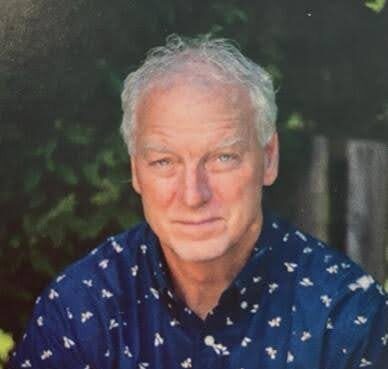Martin called himself a coward. Really?
In his seventies, he still travels the world for business. Martin is successful and wealthy and when he speaks of a “Celebration of Life” memorial service for his spouse Stella, he envisions it at a yacht club. For all this, though, Martin says he has been weak for failing to implement a “Do Not Resuscitate” order for Stella, even though, under CPR, her bones would crack like dry twigs.
I am Stella’s hospice chaplain.
“Yeah,” Martin laments to me on the phone, “I’m a wussy. I just can’t think about dying and stuff like that.”
I am a bit of a death-wuss too, although it’s not death that I fear as much as the process of dying. I fear dying in a facility which is something of a well-carpeted prison (locked, with no escape, though many try) mixed with a zoo (contrived habitat, creatures kept for occasional viewing).
I fear fading away in a hallucinatory haze, diapered, positioned daily in front of a screen displaying an endless stream of Hallmark movies and AI-generated landscapes, not knowing my spouse’s name, and trying to hit her when she visits.
Despite the divine light I have often found in these past two years as a hospice chaplain, sad images from my patients’ lives often darken my mind and soul. I have regular and urgent talks with God about the realities of death.
Ah, yes: God. We proclaim that life and death are God’s domain. Yet with the modern medical system and our choices within that system, it can be hard to find God. As a result, I am urging you to initiate a talk with your loved ones and craft a plan as best you can, just in case God doesn’t take your life suddenly and instead leaves you with choices.
Choices? Let me tell you about Lana and her big Switzerland idea, about Atul Gawande’s book, and about my father and his death plan.
Lana turned 101 during the ten months I knew her. She was miserable, but valiant. As the spouse of a military man, she was well-traveled and fearless in a man’s world. She was a vocal civil rights advocate and a free-thinking, non-religious person possessing dignity, spiritual beauty, and courage.
Unlike Stella, Lana’s mind was still razor sharp. That was the problem: Lana said it would be better if she could lose her mind so she would not know of her condition. She was tormented by pain, could barely hear, had dentures which no longer fit and clogged her mouth when she tried to speak, and her legs leaked water and blood. One day she asked me to catch the flow with one of her underwear pads and medical tape until her beloved nurse, Elizabeth, came to wrap her legs correctly. Yes, I did that.
Lana had long ago given up Christianity and had told me why. She gently asked me not to perform Christian rituals with her, yet she would touch my arm and ask to me to pray that she would die. I did that, every day, with all my heart.
When Lana confessed to the facility staff that she wanted to die, everybody freaked out. A social worker was deployed and a phalanx of anti-depressants was dispatched. But Lana wasn’t suicidal. She was simply ready to die.
There’s a difference.
Lana wanted to take her last dollars and travel to Switzerland. She had heard there were hospitals where, after an intensive set of classes, you’d find a little plastic cup of pills in your room. Later, the staff would come and gather your body. “Am I not paying $6,500 a month to sit in this facility,” she said, “in constant pain, for no reason but to wait for death anyway?” I told her I would travel to Switzerland with her.
I never dismissed her wish to die or tried to talk her out of it. I never once said, “Oh, Lana, please don’t say such things,” never once bombarded her with Bible verses that she didn’t believe anyway. I think that’s why she trusted me. Lana told me her life’s deep secrets.
One day, though, I did say, “Lana, I know you don’t believe in Jesus, but you sure look like him to me.” She guffawed at that, but with the trace of a smile. On another day, before I left her, I took her hand and said, “Lana, you won’t like it when I say this, but I love you.” She did not guffaw. She bowed her head and nodded. Four months after that, with her favorite nurse Elizabeth at her side, Lana finally died.
These days, thankfully, the kind of thing Lana described in Switzerland is possible in some states. It is called MAID (Medical Aid in Dying). I am researching this.

The last months of Lana’s life make me think of these words from Being Mortal, by Atul Gawande: “The simple view is that medicine exists to fight death and disease, and that is, of course, its most basic task. Death is the enemy. But the enemy has superior forces. Eventually, it wins. And in a war you cannot win, you don’t want a general who fights to the point of total annihilation.”
As Gawande puts it, you want a general “who knows how to fight for territory that can be won and how to surrender it when it can’t, someone who understands that the damage is greatest if all you do is battle to the bitter end.”
My father possessed Gawande’s wisdom. After brutal years of war with Parkinson’s Disease, my dad chose to transition to a care facility when my mom could no longer care for him at home. However, upon passing through the entrance of that building he firmly directed that no food should ever cross the threshold of his lips. Robert Jay Mannes did all he could until he couldn’t–and until he knew he shouldn’t–and then chose to surrender territory, to prolong nothing, and to die quickly. He was gone within a week.
Yes, I am stepping into a minefield of ethical concerns. Nonetheless, here is my conviction: there is a time to stop, but generally, we don’t. I watch people, even fiercely avowed Christian people, frantically hang on to that which the Apostle Paul said we can confidently let go of. It’s as if our hearts are horses that we whip and goad and drive past divinely ordained limits. With our choices and systems, we are relegating our loved ones, and ourselves, to lonely, prolonged, and miserable deaths.
I cannot answer the ethical concerns and cannot fix the medical system. And, God will do what God does. What remains is my stewardship of myself and my choices.
You have choices too. Muster your courage and make decisions, which will help your loved ones and save them from a slippery slope of frantic denial and family conflict. If Stella had made her choices known, it would surely ease Martin’s agony now.
I urge you to look straight at what you fear and face what you are avoiding. Have the conversation you don’t want to have with your family and/or trusted friends. Talk with a lawyer and a funeral home. Make a plan. Stipulate the timing and terms of your peaceful surrender, just in case you live long enough to have a say in the matter.
Try not to be a death-wuss.


16 Responses
Keith,
Thanks for this timely, brave piece, and the moving personal stories. Your advice to us is wise as well.
Keith,
Thanks for this timely, brave piece, and the moving personal stories. Your advice to us is wise as well.
Thank you for this. I understand what you are saying and have experienced it also. I am a hospice chaplain here in North Jersey.
Thanks for being willing to walk into this minefield, Keith. I appreciate your point of view knowing that it grows out of experiences that many of us will never share.
I love all of this. Thank you, Keith.
Keith. This is honest, brave, and so real. Thank you for the urge to think and talk about this reality.
I appreciate very much your tender respect for humans and your kindness as they make decisions. For a long time I have fought against a “ better dead than disabled “ mindset, for it can lead to premature death and prevent soul deep healing that itself alleviate some suffering. I now see that we each must make very personal decisions about the time to stop.
Thanks, Keith, for your profound care.
Love this so much, Keith. I love how honest and caring you were with Lana. That’s my goal too—do NOT try to talk people out of their pain. Do NOT speak platitudes just so you (the speaker) feels a little better.
Thank you very much. And thanks for mentioning Gawande’s excellent book.
It’s interesting to me that people’s argument against ending life with dignity is that it is “playing God”. And yet all the meds and procedures used to prolong life (my own included!) are not considered playing God.
Thank you again for this article.
Keith, I love your heart. Never change.
Thanks for your willingness to step into this ethical minefield, Keith, and offering wise advice. Both my mother and father suffered from serious dementia in their last years.
I too heartily recommend Atul Gawande’s book Being Mortal. Every senior should read it. Adult children whose parents are aging should also read it.
Of course, this piece is beautifully written and I whole heartedly agree. However, I’m somewhat haunted by this Hidden Brain podcast episode which led me to ponder, “Who knows what I’ll actually ‘want’ when the time comes?” Maybe our survival instinct overrides our current rational selves(?)
The Ventilator
By Hidden Brain Staff / March 18, 2024
Many of us believe we know how we’d choose to die. We have a sense of how we’d respond to a diagnosis of an incurable illness. This week, we revisit a 2019 episode featuring one family’s decades-long conversation about dying. What they found is that the people we are when death is far in the distance may not be the people we become when death is near.
Doggone it, Keith, this was really good.
Thank you, Keith, for this moving and thought-provoking piece. I second what others have written to recommend Atul Gwande’s incredible book. [Many of you may not know that Atul was the Assistant Administrator — under Samantha Power — at USAID until January, 2025. Our son Jeremy had worked closely with him there in the early 2020s.]
And an exhortation to all: make sure you have a living will and your physician also has a copy of it, and show it to your immediate family, so that they know what your wishes are in the event you can no longer make end of life decisions yourself. They can also ask you to clarify exactly what you mean. It gives everyone peace.
Gwanda’s Being Mortal – yes!
Thanks, Keith!
It is sometimes very hard for babies to get into the world, but it also very hard for some elderly to get out. I pray I will have a chaplain with your heart when the time comes.
God Bless elder care chaplains.
Thank you for your compassionate work. God bless you.